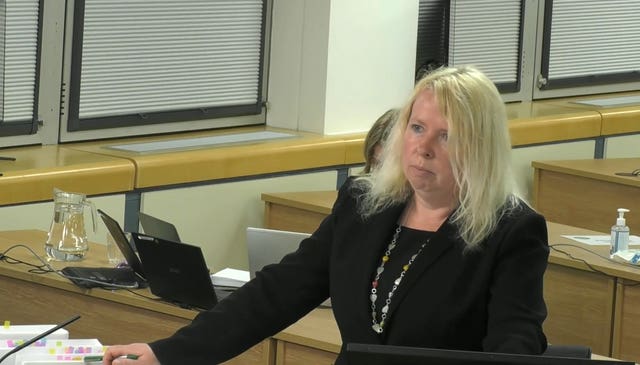Ken Clarke’s use of the phrase “there is no conclusive proof that Aids is transmitted by blood products” was “entirely accurate” at the time, an inquiry has heard.
Lord Clarke, who was health minister from 1982 to 1985 and subsequently health secretary from 1988 to 1990, defended his use of the statement 38 years ago.
The inquiry heard it was originally used in a press release in September 1983 announcing a new leaflet which was created to “discourage” those who were highly at risk of contracting Aids not to donate blood.
Appearing as a witness for the Infected Blood Inquiry, Lord Clarke told the hearing he was not the “author” of the phrase but he did agree with its use and it being attributed to him.
Lord Kenneth Clarke today continues his evidence.
Lord Clarke held roles in Government including Minister of State for Health 1982-85 and Secretary of State for Health 1988-90.
Watch live from 10:00: https://t.co/Rjyc54WVV1 pic.twitter.com/3jwBr8jPfN
— Infected Blood Inquiry (@bloodinquiry) July 28, 2021
The quote from Lord Clarke, used in the press release at the time as his role as health minister, said: “It has been suggested that Aids may be transmitted in blood or blood products, there is no conclusive proof that this is so. Nevertheless I can well appreciate the concern that this suggestion may cause.
“We must continue to minimise any possible risk of transmission of the disease by blood donation but it is not possible to test a person’s blood for the presence of Aids.”
The release went on to urge people who were at risk of Aids not to donate blood.
It was repeated again by Lord Clarke in a written response to Edwina Currie MP during Parliament in November 1983.
“It wasn’t drafted by a minister. I can’t remember who did it but obviously somebody decided that that was the best most accurate line to take,” Lord Clarke told the inquiry.
“It was repeatedly used by every minister. We kept repeating that because that was a scientific advice we had until it was perfectly clear to the medics that there was in fact sufficient proof [that Aids was transmitted]… we weren’t playing down that possibility.
“It seems to me…it’s a perfectly accurate description of where medical opinion was at that time. That’s presumably why the haemophilia doctors were still using Factor VIII.”
Lead counsel Jenni Richards QC pressed why the phrase “blood products are a likely cause of transmission of Aids” was not used instead, as it was the “mainstream view” in the department of health at that time, according to previous witness Dr Diana Walford.

Lord Clarke said: “We go on to say it’s a possibility that can’t be ruled out. I don’t know. You’ll have to ask Diana Walford that.”
Ms Richards asked if the line should have included an “express recognition” that Aids could be transmitted.
Lord Clarke responded: “Not really, it’s perfectly bloody obvious that everybody was working on that basis.”
Later on, he was questioned over the money given through the Macfarlane Trust, which was established by the Government in 1987 to give ex-gratia payments to victims and their families.
About £10 million was offered initially.
The campaigning group, The Haemophilia Society, wrote to Lord Clarke in 1989 and requested the victims be given compensation after some launched legal action against the Government.
The inquiry heard Lord Clarke was against this as he believed it would have “implications” for NHS treatment and would be costly. Instead, memos showed Lord Clarke recommending a further £20 million should be given to the trust.
It is not clear how much was given to the trust in the end.
He said: “We have to be so careful we mustn’t start admitting fault. Once you start doing that, the floodgates open. The health service cannot guarantee to cure everybody of every ailment for which it gives the best possible treatment in light of medical knowledge at the time.”
The inquiry continues.




Comments: Our rules
We want our comments to be a lively and valuable part of our community - a place where readers can debate and engage with the most important local issues. The ability to comment on our stories is a privilege, not a right, however, and that privilege may be withdrawn if it is abused or misused.
Please report any comments that break our rules.
Read the rules hereLast Updated:
Report this comment Cancel